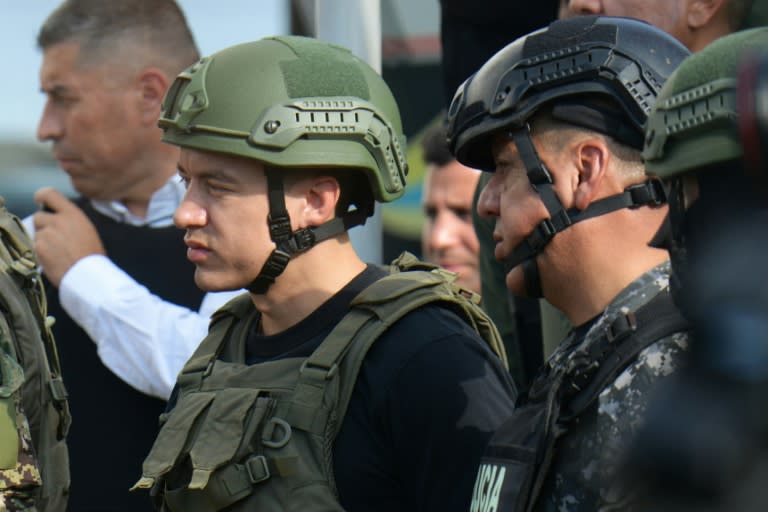Ecuador approves extradition, anti-gang measures

- Oops!Something went wrong.Please try again later.
A solid majority of Ecuadoran voters on Sunday approved the extradition to the United States of organized crime bosses in a referendum on measures against drug trafficking and gangs, the electoral council said.
The "yes" vote in favor of extradition received 65 percent of valid ballots, while "no" received 25 percent, according to a quick count of results, the electoral council said at a news conference.
Nearly 13.6 million of the country's 17.7 million inhabitants were eligible to cast a "Yes" or "No" on 11 referendum questions on the ballot.
President Daniel Noboa hailed the result as a "triumph" in the fight against crime.
"We have defended the country, now we will have more tools to fight crime and restore peace to Ecuadoran families," Noboa, 36, said earlier after the release of an exit poll.
Once-peaceful Ecuador has been grappling with a shocking rise in violence, flaring up due to a rise in narcotics trafficking, that has seen two mayors killed this week.
If Ecuador's constitution is changed to allow extradition, the nation would follow in the footsteps of Colombia and Mexico, which have sent scores of reputed crime bosses to stand trial in the United States.
Fresh bloodshed stained voting day as assailants shot dead a prison warden.
Damian Parrales, chief of the El Rodero prison in coastal Manabi state, "was victim of an attack that unfortunately cost him his life," the national prison authority said in a statement.
- Persistent violence -
Ecuadoran prisons have become nerve centers for organized crime groups and a bloody battleground that has claimed the lives of more than 460 inmates in three years.
Parrales, who had assumed his prison post just five days ago, was gunned down as he ate lunch with his family in the town of Jipijapa, local media reported.
Noboa declared in January a state of "internal armed conflict," with about 20 criminal groups blamed for a spasm of violence sparked by the jailbreak of a major drug lord, still on the run.
Gangsters kidnapped dozens of people, including police and prison guards, and opened fire in a TV studio during a live broadcast, part of a days-long spasm of violence that caused about 20 deaths.
Despite the deployment of soldiers to combat gangs, violence has persisted. Two mayors have been killed in the past week, making it five in a year and three in less than a month.
Since January last year, at least a dozen politicians have been slain in Ecuador, including presidential candidate Fernando Villavicencio, who was gunned down last August after a campaign event.
In Sunday's vote, Noboa was seeking popular backing for his plans to clamp down even harder on those responsible for such acts.
Citizens were asked to approve an expansion of military and police powers, significantly boosting gun controls and imposing harsher penalties for "terrorism" and drug trafficking.
Noboa is also proposing to change the constitution so that Ecuadorans wanted abroad for organized crime-related offenses can be extradited.
- Feeling insecure -
Last year, the country's murder rate rose to a record 43 per 100,000 inhabitants -- up from six in 2018, according to official data.
In a publication Friday, polling firm Gallup said no other region in the world, excluding active war zones, felt less secure to residents last year than Ecuador's Guayas province.
Mauricio Lopez, 36, who cast his ballot in Quito, said he had "voted 'yes,' especially to extradition" question of the referendum.
"The idea is that criminals will be more afraid, it's also a more rigorous way of punishing them," Lopez told AFP.
Voters were also asked whether they wanted to involve the army in arms control, increase penalties for organized crime and allow security forces to use seized weapons.
The vote took place in the same week that Ecuadorans faced power cuts of up to 13 hours as drought left key hydroelectric reservoirs nearly empty.
The government ordered workers to stay at home for two days in a bid to save scant energy resources.
Noboa has put some of the blame on "sabotage" without naming anyone in particular.
sp/lv/mr/st/bbk/caw/tjj/sn/mca

